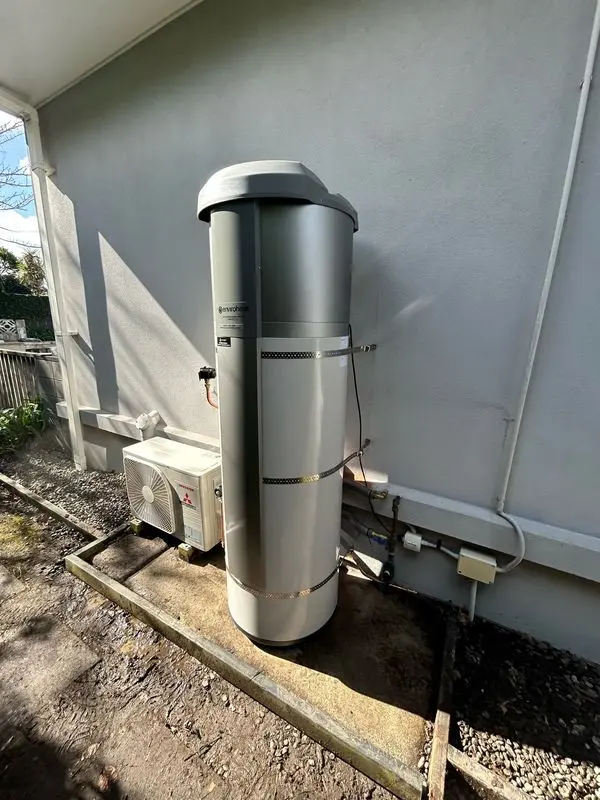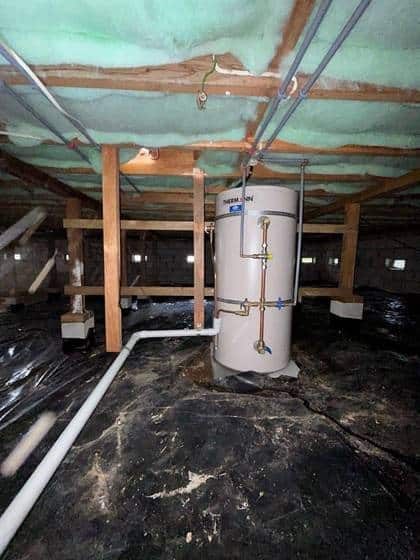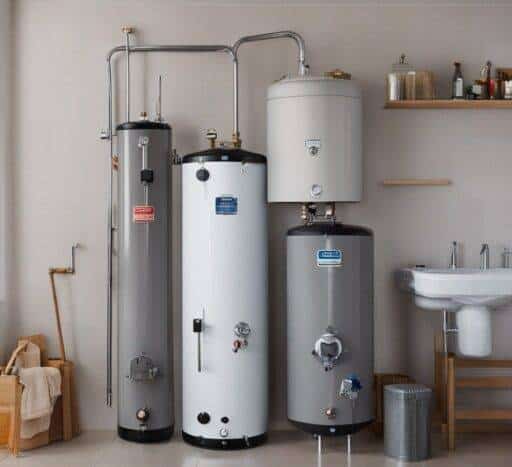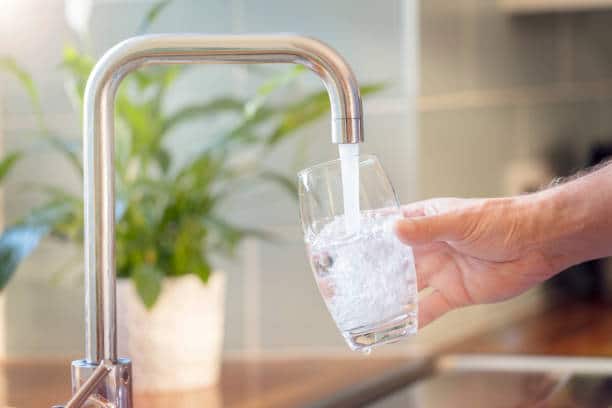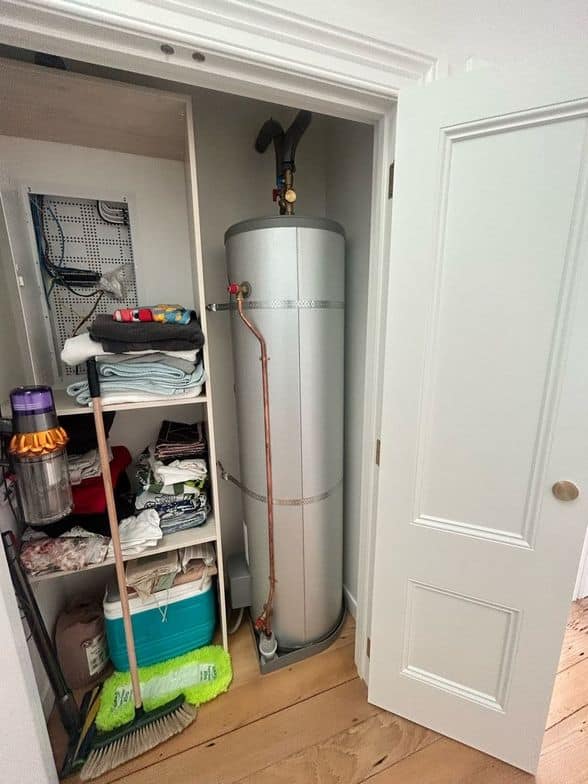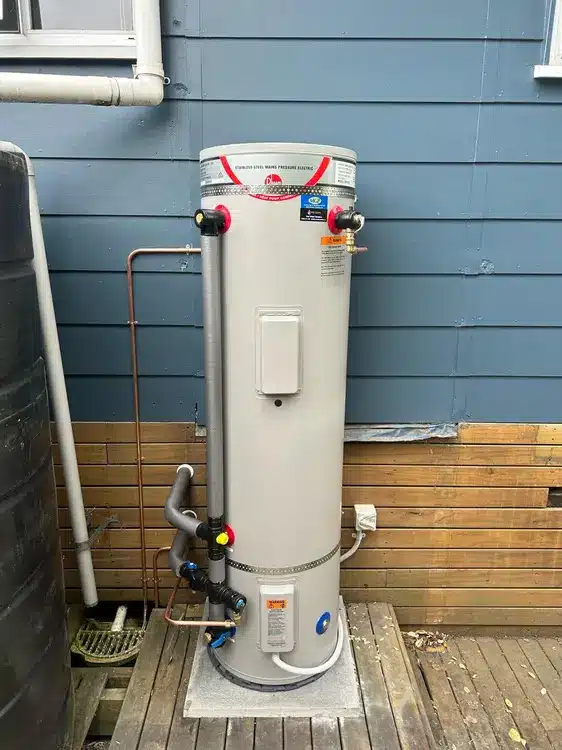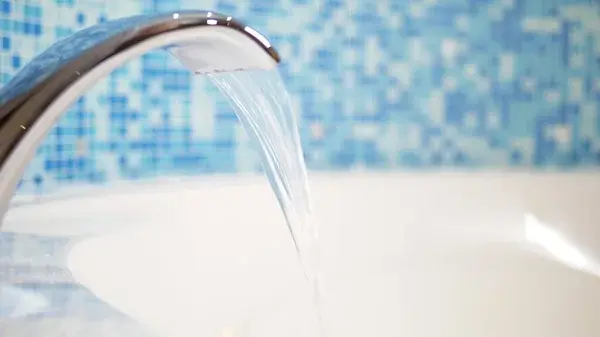How Do Heat Pump Water Heaters Work?
Heat pump water heaters work on a simple principle – they extract latent heat from ambient air and transfer it to water. The main components include:
Heat Exchanger – Pulls heat from surrounding air into refrigerant lines.
Compressor – Pressurizes the refrigerant to optimize heat transfer.
Condenser – Transfers extracted heat to water for cylinder heating.
Fan – Circulates air through the heat exchanger to maximize heat extraction.
Cylinder – Stores heated water ready for household use.
This process of leveraging heat from the air enables heat pumps to generate 2 to 5 times more energy output than the electrical energy they consume.
Cost Saving Benefits
The key benefits of installing a heat pump water heater in your Auckland home include:
Lower energy bills – Heat pumps cut water heating costs by approximately 50-65%.
Carbon emission reduction – Greater efficiency means fewer carbon emissions.
Government rebates – Qualifying heat pumps receive a $700 rebate.
Renewable energy – Heat pumps tap into ambient thermal energy.
Advanced control – Intelligent sensors match heating to demand.
Reliability – Modern heat pumps have an average 15+ year lifespan.
Peace of mind – Warranties up to 10 years provide financial protection.
Over 10-15 years, the energy savings usually far outweigh the initial purchase costs.
Ideal Locations Around Auckland
Heat pumps operate most efficiently in certain environments. Here’s an overview of the ideal environment you should provide for heat pumps to operate.
Warmer is better – Heat pumps extract more energy from warmer air.
Outdoor space – External installation leverages fresh ambient air.
Covered spaces – A carport or alcove protects the unit from rain and sun.
Ground or wall mounted – Elevated bracketing improves airflow.
Near bathrooms – Reduces heat loss from pipe runs.
Well-ventilated – Air circulation is crucial for heat extraction.
Away from windows – Prevents cold draughts and condenser recirculation.
Proper placement optimizes efficiency and heating performance.
Comparing Heat Pump Models
Many brands of heat pumps are available from leading manufacturers like Stiebel Eltron, Enviroheat, Econergy and Rheem. When comparing models, look for:
Size and capacity – Right-sized for your household’s hot water demand.
Efficiency ratings – COP of 3.0+ indicates good efficiency.
Noise levels – Quieter < 40 dBa models prevent disturbances.
Advanced sensors – Optimizes heating based on usage patterns.
Warranties – At least 5 years on parts, 10 years on cylinders.
Installer reputation – Choose certified technicians for installation.
Smart controls – WiFi-enabled pumps allow remote control.
Temperature settings – 55°C to 60°C is ideal for efficiency and bacteria control.
Consider both upfront costs and projected long-term savings when selecting your preferred heat pump option.
Installation, Maintenance & Repairs
Proper installation and maintenance ensure your heat pump performs optimally for years to come. Here’s what to consider when you are looking for hot water heat pump installation, maintenance, or repairs.
Licensed professional – Choose a certified sustainability installer.
Permit – Building consent may be required for external units.
Annual checks – Have a technician inspect refrigerant, airflow, and coils.
Clean air filter – Clogged filters reduce efficiency.
Clear debris – Keep external unit free of leaves and debris.
Protect refrigerant lines – Prevent accidental punctures during landscaping or construction.
Check anode – Help prevent cylinder corrosion every 2-3 years.
Descaling – Periodic descaling prevents mineral deposits from hard water.
Repairs – Use a certified heat pump technician for any repairs.
Take advantage of long warranties by maintaining your system according to manufacturer specifications.
Integrating Heat Pumps into Existing Systems
Heat pumps can integrate into your current hot water setup in a few ways. Here are some of the most prominent ways out of them.
Solo heat pump unit – The heat pump fully replaces your electric cylinder for all water heating.
Hybrid dual setup – Your existing cylinder acts as a supplementary backup for peak demands.
Solar pre-heating – Solar collectors heat water first, then the heat pump raises temperatures further.
Ensure your plumber correctly pipes connections to leverage both sources for hybrid systems.
Expanding Capacity
If your household demand exceeds the optimal size for a single heat pump unit, you have two options:
Install Multiple Heat Pumps
Use two smaller heat pumps instead of one oversized unit for better efficiency. Optimal for larger homes with distributed hot water demand.
Add a Secondary Cylinder
Connect an additional insulated cylinder tank that the heat pump can heat. Useful for households with spikes in heavy use.
Correctly staging multiple heat pumps or adding secondary tanks prevents shortages during high demand periods.
Comparing Open vs Closed Loop Systems
Another choice is between open and closed loop heat pump setups:
Open loop – Extracts ambient air from surroundings.
Closed loop – Recirculates heat from indoor air via a heat exchanger.
Efficiency – Open loop is generally more efficient.
Space – Closed loop is more compact.
Condensation – Closed loop prevents outdoor condensation dripping.
Installation – Open loop is easier to install.
Climate control – Closed loop avoids efficiency loss in cold climates.
Closed loop heat pumps better suit indoor installations like apartments or laundries.
Evaluating Electric vs Gas Heat Pump Water Heaters
While most run on electricity, gas heat pump water heaters are also available. Key trade-offs include:
Efficiency – Electric heat pumps tend to be more efficient.
Gas pipelines – Requires connection to piped natural gas.
Venting – Stainless flues must vent exhaust gases.
Condensate – Gas pumps create condensation requiring a drain.
Electric backup – Still need an electric element for peak loads.
Cost – Gas heat pumps have lower operating costs in some regions.
For most Auckland homes, electric heat pumps make the most sense thanks to electricity infrastructure. But gas heat pumps are worth considering if natural gas lines service your home.
Assessing Your Hot Water Needs
To select the right heat pump, you need to assess your household’s hot water requirements:
Number of occupants – More residents mean greater demand.
Peak usage times – Track when hot water usage spikes occur.
Fixtures and taps – The number of hot water outlets impacts size needs.
Average daily usage – Estimate the number of litres used based on bills or smart meters.
Future demand – Allow for potential household growth or additions.
This usage data helps right-size your system without overspending on unneeded capacity.
New Home Construction
For new home builds, heat pumps offer an energy-efficient alternative to electric cylinders:
Design for efficiency – Optimize heat pump location in floor plans.
Pre-wire for smart controls – Allows remote monitoring and optimization.
Insulate all pipes – Prevent losses between heat pump and taps.
Solar pre-heating – Combine solar thermal collectors with your heat pump.
High-efficiency plumbing – Use low-flow shower heads and taps.
Integrating a heat pump early in architectural plans allows maximizing efficiency and savings.
The Future of Heat Pumps
Ongoing innovation will further improve heat pump technology:
Lower costs – Economies of scale will continue reducing purchase prices.
Greater efficiency – Expect COP ratings exceeding 5.0 in next-gen models.
Demand optimization – Smart pumps will better match heating to household patterns.
New refrigerants – Safer, eco-friendly refrigerant gases are in development.
Smart grid integration – Heat pumps could help balance electric loads.
Regenerative cooling – Excess heat will provide home heating.
With their environmental and cost benefits, heat pumps will play an expanding role in sustainable homes.
Final Words on Hot Water Heat Pumps in Auckland
Switching to a hot water heat pump enables Aucklanders to save on bills while minimizing their carbon footprint. This guide provides key considerations for finding the ideal heat pump system for your household’s budget and hot water needs. By making an informed, future-focused choice, you can enjoy the benefits of heat pump water heating for years to come.
Contact us on our contact us page and we will be more than glad to answer your queries. Or give us a call on 0800 497658.
At Hot Water Solutions all we do is hot water.

